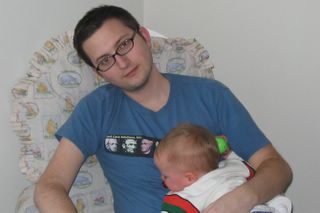
19 March 2006
16 March 2006
Why I'm not "Big O Orthodox"
Conversation over at the Ooze has been fairly fruitful of late. I've advocated for academic study bibles, tried to give an account of some feminisms' potential for Christian theology, and discussed an archaeological approach to theology.
As I've discussed these things, I've once again come into some degree of conflict with converts to Eastern and Oriental Orthodoxy, and I'm starting to get a handle on why my own intellectual and theological convictions in the end won't likely make a very good fit to the ancient episcopacies. That's not to say that mine is the only way or even a good way, simply that if I'm honest, and if my honesty ends up serving a role in the larger life of the Church, it's going to serve better outside of those traditions. So this will be an honest account, my own, of the differences between theirs and my stories of Jesus and the world.
Every history of theology is also an account of Jesus' place in history. Orthodox and Catholic Christians (especially those who have converted into those traditions) tell a compelling story about the Incarnation and intellectual history. When God sends Jesus into the world, intellectual conditions (within the sects of Judaism and in the larger Greco-Roman contexts) were just perfect for the Gospel to emerge. The rites of first-century synagogue and temple life translated well into Christian liturgical forms, and Hellenized Alexandrian Judaism and middle-Platonic forms of thought served as handy wineskins for the new wine.
Yes, I did just stack the deck there. You're very clever for catching it.
Thus philosophical questions that seem to have arisen in the centuries after the first CE (or AD if one prefers) are at best rehashings of the oldies but goodies and at worst direct attacks on the contexts and forms that best sustain the intellectual life of the faith. Questions of race and class and gender, to the extent that they call into question old formulations, are invitations to sinful resentment. Epistemological inquiry might look like a denial of the very possibility of truth. And so on.
Thus the history of the Church's intellectual life is one of conservation and of corruption, and not much else.
Oops. You caught me stacking the deck again. I'm not so clever after all.
I tend to see Christian intellectual theory differently. One of the images that most readily occurs is the rending of the temple curtain. Whatever the primary symbolism of that action in the aftermath of the crucifixion, it evokes some fear and trembling: the most holy place isn't the same place it used to be.
The point of this bit of theatrics is that Jesus, as I imagine Jesus, is a man and a phenomenon too grand to be grasped in one generation. I doubt that many would dispute this in the abstract, but in more practical terms I mean that a reliance solely on those first two centuries is likely going to miss something. Theological data, like scientific data, are theory-laden, and if we Christians rely solely on the theoretical frameworks constructed in Platonic and Stoic times and places, we're going to be stuck with dead theories about a living God. Inventing new content to supplement the self-revelation of the Trinitarian God is not what I'm after; instead, I hope that people in different times and different places can see different things that might have been hiding behind their temporal and spatial neighbors' bad philosophies.
This is not to say that any generation is going to have any sort of direct access to an un-theory-laden Jesus or an unmediated crack at the Biblical texts; it's simply to say that as frameworks change, this era's contribution to the grand conversation might be to open up space to see what a Trinitarian God looks like apart from the Platonic insistence of some sort of "atemporal" realm. Or perhaps a hopeful and critical look through Wittgensteinian linguistic philosophy might let us evaluate more helpfully our reifications and too-tight categories.
Of course every generation is going to have to discern, through the indwelling Spirit, the harmful and helpful in every time and every place. Nobody that I know advocates an unthinking embrace of every new kind of thought. On the other hand, if the Church, extended in time and space, needs my generation's critical faculties in order to clarify this or that bit of divine revelation, I can hardly ignore the cloud of witnesses waiting to see how I'm going to run that race.
As I've discussed these things, I've once again come into some degree of conflict with converts to Eastern and Oriental Orthodoxy, and I'm starting to get a handle on why my own intellectual and theological convictions in the end won't likely make a very good fit to the ancient episcopacies. That's not to say that mine is the only way or even a good way, simply that if I'm honest, and if my honesty ends up serving a role in the larger life of the Church, it's going to serve better outside of those traditions. So this will be an honest account, my own, of the differences between theirs and my stories of Jesus and the world.
Every history of theology is also an account of Jesus' place in history. Orthodox and Catholic Christians (especially those who have converted into those traditions) tell a compelling story about the Incarnation and intellectual history. When God sends Jesus into the world, intellectual conditions (within the sects of Judaism and in the larger Greco-Roman contexts) were just perfect for the Gospel to emerge. The rites of first-century synagogue and temple life translated well into Christian liturgical forms, and Hellenized Alexandrian Judaism and middle-Platonic forms of thought served as handy wineskins for the new wine.
Yes, I did just stack the deck there. You're very clever for catching it.
Thus philosophical questions that seem to have arisen in the centuries after the first CE (or AD if one prefers) are at best rehashings of the oldies but goodies and at worst direct attacks on the contexts and forms that best sustain the intellectual life of the faith. Questions of race and class and gender, to the extent that they call into question old formulations, are invitations to sinful resentment. Epistemological inquiry might look like a denial of the very possibility of truth. And so on.
Thus the history of the Church's intellectual life is one of conservation and of corruption, and not much else.
Oops. You caught me stacking the deck again. I'm not so clever after all.
I tend to see Christian intellectual theory differently. One of the images that most readily occurs is the rending of the temple curtain. Whatever the primary symbolism of that action in the aftermath of the crucifixion, it evokes some fear and trembling: the most holy place isn't the same place it used to be.
The point of this bit of theatrics is that Jesus, as I imagine Jesus, is a man and a phenomenon too grand to be grasped in one generation. I doubt that many would dispute this in the abstract, but in more practical terms I mean that a reliance solely on those first two centuries is likely going to miss something. Theological data, like scientific data, are theory-laden, and if we Christians rely solely on the theoretical frameworks constructed in Platonic and Stoic times and places, we're going to be stuck with dead theories about a living God. Inventing new content to supplement the self-revelation of the Trinitarian God is not what I'm after; instead, I hope that people in different times and different places can see different things that might have been hiding behind their temporal and spatial neighbors' bad philosophies.
This is not to say that any generation is going to have any sort of direct access to an un-theory-laden Jesus or an unmediated crack at the Biblical texts; it's simply to say that as frameworks change, this era's contribution to the grand conversation might be to open up space to see what a Trinitarian God looks like apart from the Platonic insistence of some sort of "atemporal" realm. Or perhaps a hopeful and critical look through Wittgensteinian linguistic philosophy might let us evaluate more helpfully our reifications and too-tight categories.
Of course every generation is going to have to discern, through the indwelling Spirit, the harmful and helpful in every time and every place. Nobody that I know advocates an unthinking embrace of every new kind of thought. On the other hand, if the Church, extended in time and space, needs my generation's critical faculties in order to clarify this or that bit of divine revelation, I can hardly ignore the cloud of witnesses waiting to see how I'm going to run that race.
13 March 2006
The Death of the Blog?
Well, I've got baby pictures at least...
I don't know whether I can blame a lack of time for my paucity of posts lately. I've had spurts of free time between classes and teaching and parenting, but I've tended to do other things. I've played a few downs of Madden. I've watched a bit of TV. I've read a few non-assigned texts.
It might be that I just don't have the spare creative capacity to write lesson plans and papers and Sunday school sessions and blog entries. I don't know.
But hey, at least this is one!
I don't know whether I can blame a lack of time for my paucity of posts lately. I've had spurts of free time between classes and teaching and parenting, but I've tended to do other things. I've played a few downs of Madden. I've watched a bit of TV. I've read a few non-assigned texts.
It might be that I just don't have the spare creative capacity to write lesson plans and papers and Sunday school sessions and blog entries. I don't know.
But hey, at least this is one!
Subscribe to:
Comments (Atom)














